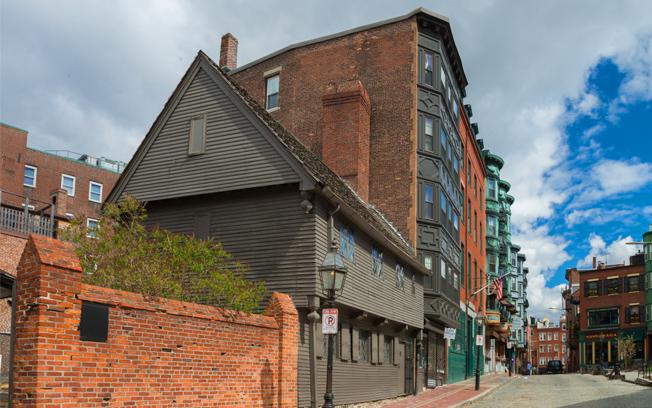Boston’s founding stands as a pivotal chapter in early American history, rooted deeply in the Puritan vision that shaped its identity and values. Established in 1630 by English settlers seeking religious freedom and a new beginning, Boston quickly emerged as a center of Puritan influence, governance, and community. Today, the city’s Puritan origins continue to resonate, informing its cultural, social, and political legacy. This article explores the foundations of Boston’s establishment, revealing how Puritan ideals molded the city’s early character and left an enduring imprint on its development.
Table of Contents
- Boston’s Founding Roots in Puritan Ideals and Community Structure
- The Role of Religion in Shaping Early Boston Society
- Legacy of Puritan Governance in Modern Boston Institutions
- Preserving Boston’s Puritan Heritage Through Education and Tourism
- The Way Forward
Boston’s Founding Roots in Puritan Ideals and Community Structure
In the early 17th century, Boston emerged as a beacon of Puritan values, shaping its identity around a theocratic framework that would endure for centuries. The city’s founders, seeking religious freedom and societal order, crafted a community guided by strict moral codes and communal responsibilities. These principles were more than spiritual aspirations; they established a governance model that prioritized collective wellbeing and discipline, setting Boston apart as a pioneering colonial stronghold.
Key elements of this structure included:
- A covenant community where individuals bound themselves to mutual accountability
- Church-centered governance that influenced legal and social norms
- An emphasis on education to preserve and propagate Puritan ethics
This framework not only laid the foundation for Boston’s distinct character but also impacted the broader political and cultural evolution of New England, echoing through its public institutions and civic life well beyond the colonial period.
The Role of Religion in Shaping Early Boston Society
In the nascent days of Boston, faith was not merely a private affair but the cornerstone upon which society was meticulously constructed. The Puritan settlers viewed their city as a “city upon a hill,” a divine experiment reflecting God’s will on earth. This religious vision governed every facet of life, influencing laws, education, and community interactions. Churches were central gathering places, acting as both spiritual havens and civic halls where moral conduct was maintained with an iron will. The intertwining of religion and governance created a theocratic society where deviation from Puritan norms could mean social ostracism or legal repercussions.
Key impacts of religion on early Boston include:
- Legal Framework: Laws were strictly based on biblical principles, ensuring that the moral code was enforced by civil authorities.
- Education Priorities: Establishing schools like the Boston Latin School emphasized religious instruction, preparing youth to be devout leaders.
- Social Order: Community oversight through church attendance and public confession upheld conformity and deterred dissent.
This rigorous religiosity shaped a resilient society, setting a cultural legacy that would permeate Boston’s identity for centuries. While later generations sought more secular governance, the echoes of Puritan discipline and collective purpose remain etched in Boston’s historical narrative.
Legacy of Puritan Governance in Modern Boston Institutions
Modern Boston’s institutional framework quietly echoes the stringent, community-centered governance model laid down by its Puritan founders. These early settlers instituted a blend of civic duty and religious morality that shaped the city’s political culture, emphasizing public responsibility and ethical leadership. Today’s Boston city council, with its robust town-meeting tradition and prioritization of civic engagement, reflects this historical blueprint. Moreover, Boston’s public education system, renowned for its rigorous standards and civic-minded curriculum, traces its roots to the Puritan belief in an educated populace as essential to moral and societal order.
Beyond governance, the legacy manifests in Boston’s legal and social institutions through enduring principles:
- Accountability: The Puritan insistence on transparent decision-making survives in the city’s open governance policies and citizen oversight committees.
- Community welfare: Social services and public health initiatives echo the early communal care efforts mandated by Puritan leaders.
- Ethical stewardship: Boston’s emphasis on integrity within public office can be traced to the moral codes integrated into Puritan law.
These foundational influences continue to shape how Boston balances tradition with modern governance, making the city’s institutions uniquely reflective of its Puritan heritage.
Preserving Boston’s Puritan Heritage Through Education and Tourism
Boston’s Puritan roots are meticulously preserved through a dynamic blend of education and tourism that invites both locals and visitors to engage deeply with the city’s foundational beliefs and values. Museums, historic landmarks, and interactive exhibits convey the profound influence Puritan ethics had on Boston’s governance, community welfare, and social norms. Institutions like the Old State House and the Massachusetts Historical Society offer guided tours and educational programs that illuminate the complex legacy of the Puritans, presenting their stories not merely as history but as a living framework that continues to shape civic identity.
Cultural initiatives emphasize hands-on learning experiences, such as reenactments, workshops, and lecture series, which foster an immersive understanding of early colonial life. Community events and heritage festivals showcase:
- Authentic Puritan-era craftsmanship and daily practices,
- Integrity-driven leadership principles that inspired modern democratic ideas,
- Social justice movements that trace their ideological roots to Puritan congregationalism.
This dual focus on education and tourism ensures that Boston’s Puritan heritage remains a vital, accessible, and evolving element of its cultural tapestry.
The Way Forward
In tracing Boston’s roots back to its Puritan founders, it becomes clear that the city’s character and values were profoundly shaped by those early settlers. Their vision of community, governance, and morality laid the groundwork for a legacy that still influences Boston today. As the city continues to evolve, understanding its Puritan origins offers valuable insight into the enduring cultural and historical forces at play. Boston’s story is not just one of a thriving modern metropolis but also a testament to the complex and lasting impact of its founding ideals.

